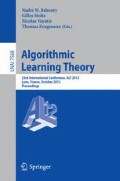Abstract
We present a new analysis of the problem of learning with drifting distributions in the batch setting using the notion of discrepancy. We prove learning bounds based on the Rademacher complexity of the hypothesis set and the discrepancy of distributions both for a drifting PAC scenario and a tracking scenario. Our bounds are always tighter and in some cases substantially improve upon previous ones based on the L 1 distance. We also present a generalization of the standard on-line to batch conversion to the drifting scenario in terms of the discrepancy and arbitrary convex combinations of hypotheses. We introduce a new algorithm exploiting these learning guarantees, which we show can be formulated as a simple QP. Finally, we report the results of preliminary experiments demonstrating the benefits of this algorithm.
Access this chapter
Tax calculation will be finalised at checkout
Purchases are for personal use only
Preview
Unable to display preview. Download preview PDF.
References
Valiant, L.G.: A theory of the learnable. ACM Press, New York (1984)
Vapnik, V.N.: Statistical Learning Theory. J. Wiley & Sons (1998)
Cesa-Bianchi, N., Lugosi, G.: Prediction, learning, and games. Cambridge University Press (2006)
Herbster, M., Warmuth, M.: Tracking the best expert. Machine Learning 32(2), 151–178 (1998)
Herbster, M., Warmuth, M.: Tracking the best linear predictor. Journal of Machine Learning Research 1, 281–309 (2001)
Cavallanti, G., Cesa-Bianchi, N., Gentile, C.: Tracking the best hyperplane with a simple budget perceptron. Machine Learning 69(2/3), 143–167 (2007)
Helmbold, D.P., Long, P.M.: Tracking drifting concepts by minimizing disagreements. Machine Learning 14(1), 27–46 (1994)
Bartlett, P.L.: Learning with a slowly changing distribution. In: Proceedings of the Fifth Annual Workshop on Computational Learning Theory, COLT 1992, pp. 243–252. ACM, New York (1992)
Long, P.M.: The complexity of learning according to two models of a drifting environment. Machine Learning 37, 337–354 (1999)
Barve, R.D., Long, P.M.: On the complexity of learning from drifting distributions. Information and Computation 138(2), 101–123 (1997)
Freund, Y., Mansour, Y.: Learning under Persistent Drift. In: Ben-David, S. (ed.) EuroCOLT 1997. LNCS, vol. 1208, pp. 109–118. Springer, Heidelberg (1997)
Bartlett, P.L., Ben-David, S., Kulkarni, S.: Learning changing concepts by exploiting the structure of change. Machine Learning 41, 153–174 (2000)
Crammer, K., Even-Dar, E., Mansour, Y., Vaughan, J.W.: Regret minimization with concept drift. In: COLT, pp. 168–180 (2010)
Mansour, Y., Mohri, M., Rostamizadeh, A.: Domain adaptation: Learning bounds and algorithms. In: Proceedings of COLT. Omnipress, Montréal (2009)
Valiant, P.: Testing symmetric properties of distributions. SIAM J. Comput. 40(6), 1927–1968 (2011)
Rakhlin, A., Sridharan, K., Tewari, A.: Online learning: Random averages, combinatorial parameters, and learnability (2010)
Cortes, C., Mohri, M.: Domain Adaptation in Regression. In: Kivinen, J., Szepesvári, C., Ukkonen, E., Zeugmann, T. (eds.) ALT 2011. LNCS, vol. 6925, pp. 308–323. Springer, Heidelberg (2011)
Dudley, R.M.: A course on empirical processes. Lecture Notes in Math., vol. 1097, pp. 2–142 (1984)
Pollard, D.: Convergence of Stochastic Processess. Springer, New York (1984)
Talagrand, M.: The Generic Chaining. Springer, New York (2005)
Littlestone, N.: From on-line to batch learning. In: Proceedings of the Second Annual Workshop on Computational Learning Theory, pp. 269–284. Morgan Kaufmann Publishers Inc. (1989)
Cesa-Bianchi, N., Conconi, A., Gentile, C.: On the generalization ability of on-line learning algorithms. In: NIPS, pp. 359–366 (2001)
Widrow, B., Hoff, M.E.: Adaptive switching circuits. Neurocomputing: Foundations of Research (1988)
Author information
Authors and Affiliations
Editor information
Editors and Affiliations
Rights and permissions
Copyright information
© 2012 Springer-Verlag Berlin Heidelberg
About this paper
Cite this paper
Mohri, M., Muñoz Medina, A. (2012). New Analysis and Algorithm for Learning with Drifting Distributions. In: Bshouty, N.H., Stoltz, G., Vayatis, N., Zeugmann, T. (eds) Algorithmic Learning Theory. ALT 2012. Lecture Notes in Computer Science(), vol 7568. Springer, Berlin, Heidelberg. https://doi.org/10.1007/978-3-642-34106-9_13
Download citation
DOI: https://doi.org/10.1007/978-3-642-34106-9_13
Publisher Name: Springer, Berlin, Heidelberg
Print ISBN: 978-3-642-34105-2
Online ISBN: 978-3-642-34106-9
eBook Packages: Computer ScienceComputer Science (R0)

